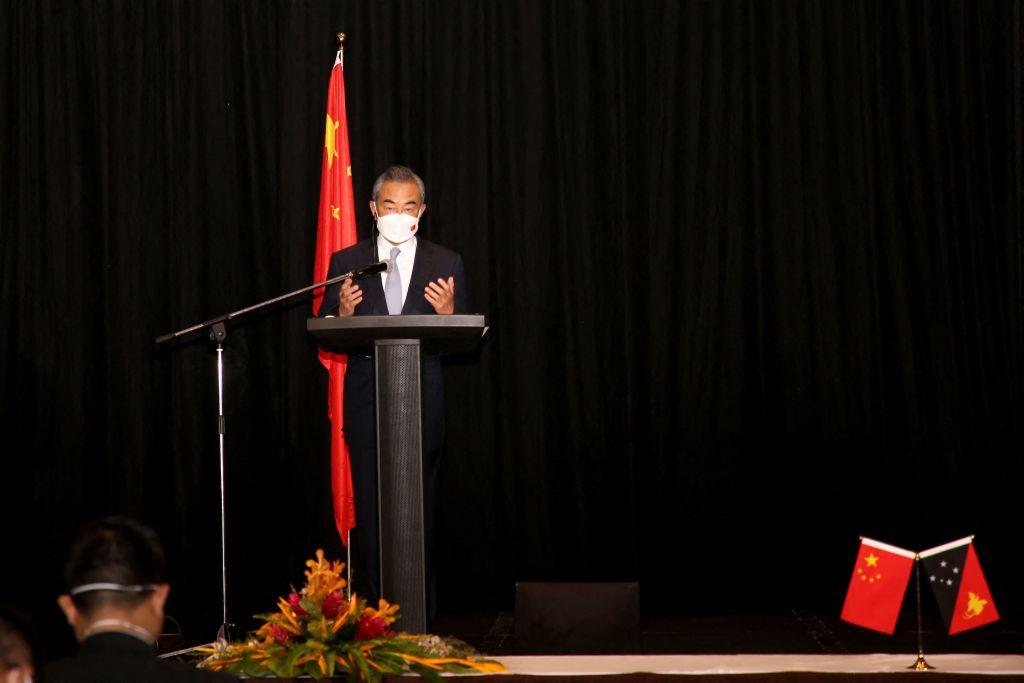
Media coverage of Chinese Foreign Minister Wang Yi’s recent visit to the South Pacific was effectively silenced, highlighting the fragility of a free media in the region.
Most journalists, especially those working for international outlets, were restricted, some physically, from attending Wang’s news conferences. The restrictions varied from country to country during the trip, but the overall effect prevented coverage of the trip despite the protests of local media.
Details of meetings and bilateral agreements signed by Pacific nations with China remain a secret. Despite some speculation in individual countries, it’s not known if any of these deals were security treaties like the China–Solomon Islands pact.
Not a single question from a Pacific journalist was allowed to be asked of the visiting minister midway through the tour.
While the Chinese delegation effectively shut down the Pacific media, it didn’t always act alone. Some Pacific governments were accused of acting to support the restrictions.
The Chinese delegation planned a marathon trip to eight Pacific countries to convince them to sign a multilateral security treaty. The agreement was rejected by Pacific leaders, but it’s thought Beijing will try again.
When the media contacted their governments and local Chinese diplomats in May for details of the trip and plans for meetings, they were met with silence.
China is one of the worst countries in the world for media freedom. It ranks 175th out of 180 countries on the 2022 World Press Freedom Index. Now it’s trying to influence media around the world, especially in countries where it has diplomatic allegiances. In the Pacific, this includes eight of 10 countries included in Wang’s high-level trip.
The Chinese delegation justified the decision to ban questions from journalists or to exclude the media by citing a ‘lack of time’ and the ‘Covid-19 pandemic’.
While Beijing courts the media with money, junkets and propaganda, it shuts down the free media, showing contempt for critical speech and dissent. That’s what happened on this trip.
A free press has traditionally been viewed as an essential part of democracy. Often described as a public watchdog, an independent media holds leaders to account and offers a reliable diversity of opinion.
This traditional role has changed with the spread of new, digital media, which has increased communication between people all over the world, especially in the Pacific where internet penetration has grown rapidly to reach more than 60% in most countries except Papua New Guinea and Solomon Islands.
Pacific islanders now use mobile phones to communicate and share information and hold leaders to account through social media. Recent statistics show that of approximately 930,000 people using mobile phones in PNG, more than 97% are Facebook users.
It’s where much of the Pacific gets its news and where news of the Chinese FM’s snub of Pacific journalists spread rapidly. Journalists used social media as a tool to raise support and awareness internationally of the restrictions they faced covering Wang’s visit.
The Pacific media is already struggling to survive because of digitisation, Covid-19 and the worldwide downturn in advertising.
A prominent supporter of media freedom, Shailendra Singh, associate professor of journalism at the University of the South Pacific in Fiji, said the lack of access for Pacific journalists during the Wang visit raised many questions.
He said the state of the media in the Pacific wasn’t just a national issue but a regional one.
‘We have two different systems here. China has a different political system—a totalitarian system—and in the Pacific, we have a democratic system,’ he said.
The news that New Zealand and Australia now agree that the region is a contested space means there’s also a contest for a free media and, with it, democracy.
Solomon Islands journalist Dorothy Wickham said her local colleagues who boycotted the visit are being excluded from all government information as a form of retribution. She says she wrote to the Chinese ambassador in Canberra complaining about their treatment and received a conciliatory response. She and fellow journalist Georgina Kekea were invited to an online interview with the foreign minister but she’s waiting for confirmation of a date.
The Chinese are not the only ones who have avoided talking to the Pacific media. It is a practice followed by many high-level delegations, including those from democratic nations like Australia and the United States.
The new Australian government has been working to reset its relationship with the Pacific since the May election. Foreign Minister Penny Wong’s three trips to the region have demonstrated a new tone and attitude towards the region and the media. She has welcomed questions from Pacific journalists and even invited some to lunch in Honiara to discuss the threats to a free media.
But China has made inroads into influencing the Pacific media and many outlets are vulnerable to offers of financial help. China is offering a way for them to survive. The fact that they stood up and challenged the restrictions is encouraging, but they need support from neighbours like Australia and New Zealand or there won’t be a free media in the Pacific.